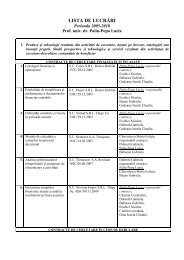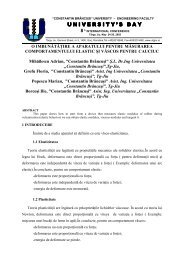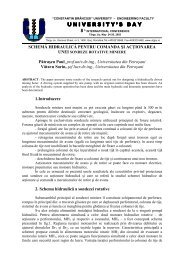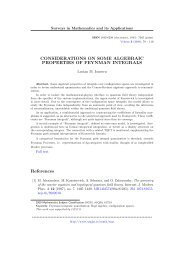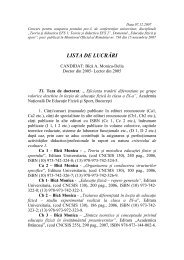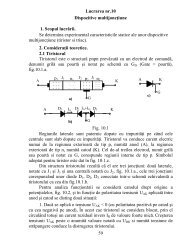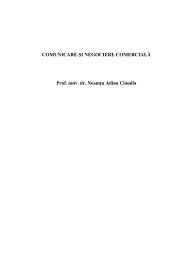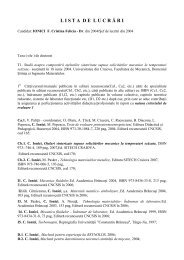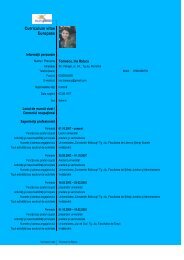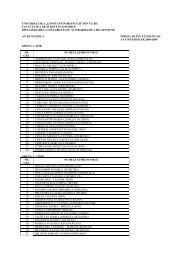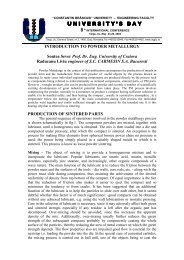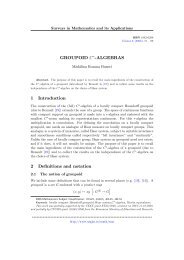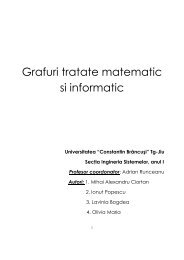NO. 2 / 2008 - Universitatea "Constantin BrâncuÅi"
NO. 2 / 2008 - Universitatea "Constantin BrâncuÅi"
NO. 2 / 2008 - Universitatea "Constantin BrâncuÅi"
Create successful ePaper yourself
Turn your PDF publications into a flip-book with our unique Google optimized e-Paper software.
Analele Universităţii “<strong>Constantin</strong> Brâncuşi” din Târgu Jiu, Seria Litere şi Ştiinţe Sociale, Nr. 2/<strong>2008</strong>stadii senzomotorii şi preoperaţionale) şikoino-genetice (Bateson: convergenţaconştiinţei individului este atinsă prinînvăţare).În al doilea rând, oricare şi fiecaredintre noi este invitat să subscrie în modconştient la această necesitate genetică.Aceasta reprezintă angajamentul filozoficpar excellence, dar nu este în niciun felrestricţionat filozofului, profesionistului saualtora. Pentru a rezuma: simpla separare acelor patru poate fi întâlnită la nivelulangajamentului existenţial al individuluicare ratifică prin acţiunile sale armonia maimultora şi deci ajunge dincolo de ea. Înconcepţia antică (care nu este neapăratdualistă): trebuie să conştientizăm atâtrădăcinile noastre terestre, cât şi destinulnostru ceresc..Acum, există un concept foartesimplu pentru a denumi această comunitateîn act: înţelepciunea sau sensus communis,în care converg în mod necesar teoria şipractica, raţionalul şi empiricul. Noi avemnevoie de o versiune revizuită aînţelepciunii pentru a evita conotaţiilenegative ale termenului. Arendt a oferitanalize interesante în jurul noţiunilor deintersubiectivitate şi interobiectivitate, 5precum şi Husserl cu conceptul său“Urdoxa” 6 şi Merleau-Ponty cu “credinţaperceptivă” 7 care caracterizează aparţinereanoastră la lume: nu numai că suntem sigurică ceea ce percepem este real, dar osuspendare momentană a percepţiei nuanulează această certitudine. O încercarerecentă mai asemnănătoare are loc înstudiile lui Whiteheadian referitoare lanoţiunile de înţelepciune nucleu ale luiGriffin, 8 care califică credinţele universaleşi primordiale că fiinţele umane nu pun laîndoială in practică: libertatea lorfundamentală, eficienţa cauzală a acţiunilorlor, existenţa lumii reale, a valorilor şi a aunei mişcări temporale. Ceea ce estefundamental (necesar) rezonabil este ceeace nu pune în pericol legătura vitală –carnală Urdoxastică pe care o păstrăm culumea percepută.the individual are a posteriori for thespecies), onto-genetic (Piaget: cognitivecategories are developed throughsensorimotor and preoperational stages) andkoino-genetic (Bateson: the convergence ofindividual consciousness is achievedthrough learning).Second, each and everyone of us isinvited to consciously subscribe to thisgenetic necessity. This constitutes thephilosophical commitment par excellence,but it is by no means restricted to thephilosopher, professional or otherwise. Tosummarize: the simple singlefoldness of thefour is to be found at the level of theexistential commitment of the individualwho ratifies through his actions thetogetherness of the many and thereby goesbeyond it. In ancient parlance (that is notnecessarily dualistic): we have to fullyacknowledge both our terrestrial roots andour celestial destiny.Now there is a very simple conceptto name this community in the act: commonsense or sensus communis, in which theoryand practice, the rational and the empirical,necessarily converge. Granted, we need arefined version of common sense in order toavoid the negative connotations of the term.Arendt has provided interesting insightshere around the notions of intersubjectivityand interobjectivity, 17 so did Husserl withhis concept of “Urdoxa” 18 and Merleau-Ponty with the “perceptive faith” 19 thatcharacterizes our belonging to the world:not only are we sure that what we perceiveis real, but a momentary suspension ofperception does not nullify that certainty. Amore recent similar attempt took actuallyplace in Whiteheadian studies withGriffin’s hard-core common-sensenotions, 20 that qualify the universal andprimordial beliefs that human beings do notquestion in practice: their fundamentalfreedom, the causal efficacy of theiractions, the existence of a real world, ofvalues and of a temporal drift. What isfundamentally (necessarily) reasonable iswhat does not endanger the UrdoxasticAnnals of the „<strong>Constantin</strong> Brâncuşi” University of Târgu Jiu, Series Letters and Social Sciences, No. 2/<strong>2008</strong>42



